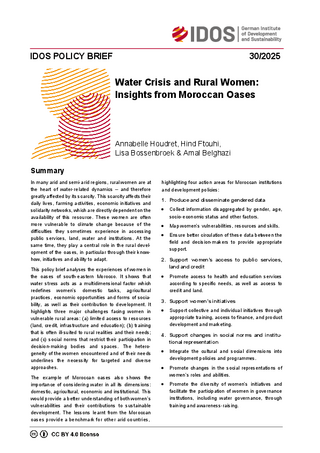Water crisis and rural women: insights from Moroccan oases
Houdret, Annabelle / Hind Ftouhi / Lisa Bossenbroek / Amal BelghaziPolicy Brief (30/2025)
Bonn: German Institute of Development and Sustainability (IDOS)
DOI: https://doi.org/10.23661/ipb30.2025
Frz. Ausg. u.d.T.:
Femmes rurales face à la pénurie d’eau : exemples des oasis marocaines
(IDOS Policy Brief 31/2025)
Arab. Ausg. u.d.T.:
لنساء القرويات في مواجهة ندرة المياه: حالة الواحات في المغرب
(IDOS Policy Brief 38/2025)
In many arid and semi-arid regions, rural women are at the heart of water-related dynamics – and therefore greatly affected by its scarcity. This scarcity affects their daily lives, farming activities, economic initiatives and solidarity networks, which are directly dependent on the availability of this resource. These women are often more vulnerable to climate change because of the difficulties they sometimes experience in accessing public services, land, water and institutions. At the same time, they play a central role in the rural development of the oases, in particular through their know-how, initiatives and ability to adapt. This policy brief analyses the experiences of women in the oases of south-eastern Morocco. It shows that water stress acts as a multidimensional factor which redefines women’s domestic tasks, agricultural practices, economic opportunities and forms of sociability, as well as their contribution to development. It highlights three major challenges facing women in vulnerable rural areas: (a) limited access to resources (land, credit, infrastructure and education); (b) training that is often ill-suited to rural realities and their needs; and (c) social norms that restrict their participation in decision-making bodies and spaces. The heterogeneity of the women encountered and of their needs underlines the necessity for targeted and diverse approaches. The example of Moroccan oases also shows the importance of considering water in all its dimensions: domestic, agricultural, economic and institutional. This would provide a better understanding of both women’s vulnerabilities and their contributions to sustainable development. The lessons learnt from the Moroccan oases provide a benchmark for other arid countries, highlighting four action areas for Moroccan institutions and development policies:
1. Produce and disseminate gendered data
• Collect information disaggregated by gender, age, socio-economic status and other factors.
• Map women’s vulnerabilities, resources and skills.
• Ensure better circulation of these data between the field and decision-makers to provide appropriate support.
2. Support women’s access to public services, land and credit
• Promote access to health and education services according to specific needs, as well as access to credit and land.
3. Support women’s initiatives
• Support collective and individual initiatives through appropriate training, access to finance, and product development and marketing.
4. Support changes in social norms and institutional representation
• Integrate the cultural and social dimensions into development policies and programmes.
• Promote changes in the social representations of women’s roles and abilities.
• Promote the diversity of women’s initiatives and facilitate the participation of women in governance institutions, including water governance, through training and awareness-raising.
Hind Ftouhi is a senior researcher at the Institut National d’Aménagement et d'Urbanisme (INAU-Rabat).
Lisa Bossenbroek is a senior researcher at the Centre de Recherche sur les Sociétés Contemporaines (CRESC-Rabat).
Amal Belghazi is a doctoral student at l’Université Hassan II, Faculté des lettres et des sciences humaines et sociales Ain Chock in Casablanca.


